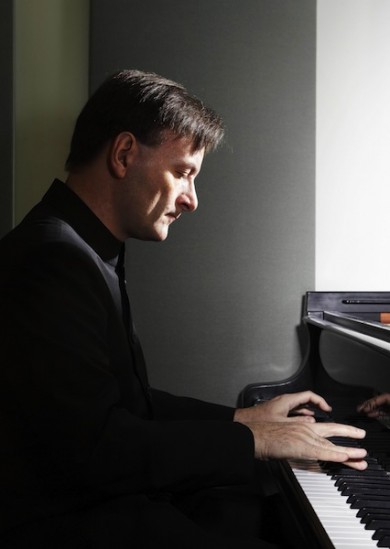Hough’s Beethoven proves illuminating in abridged program

Stephen Hough performed Beethoven’s “Emperor” Concerto Friday night with the FIU Symphony Orchestra conducted by James Judd.
Stephen Hough is a thinking man’s pianist. His performances are always intelligently conceived through intense study of the score at hand and its historical background and performance traditions. The multi-talented Hough is also a composer, columnist for the London newspaper The Guardian and an active blogger. His repertoire has included scores from the byways of 19th- and early 20th-century composition as well as mainstream works.
A full house turned out at Florida International University’s Wertheim Auditorium on Friday night for what was long ago announced as a double bill of Hough performing Beethoven’s Concerto No. 5 and Liszt’s Concerto No. 1 with the FIU Symphony Orchestra under James Judd, jointly presented by FIU Music and Friends of Chamber Music.
Prior to the concert, FIU music department director Robert B. Dundas told the audience that, since the students had just returned from holiday break this week, there was insufficient time for the orchestra to prepare both concertos so only the Beethoven would be played.
Why was the university not aware of the time and rehearsal constraints when the concert was planned and announced months ago? And why didn’t the presenters let people know earlier that the Liszt would not be performed? Under the circumstances, the program was decidedly short shrift for the audience.
Still, Hough offered a memorable, musically imaginative “Emperor.”
In post-performance remarks, Hough noted that the concerto’s first E-flat major chord is “the beginning of something absolutely earthshaking.” Indeed that opening resounded differently than in past South Florida performances. It is usually played by the orchestra, lacking the resolutions of a fifth, prior to the piano’s entrance.
After study of Beethoven’s manuscript, Hough concluded that the piano should play the opening with the orchestra and connect directly into the succeeding arpeggios, adding the crucial resolution of the opening note. That small detail was only the beginning of a reading replete with fresh insights that avoided hackneyed conventionality.
Hough said that energy was a hallmark of Beethoven’s final original solo keyboard concerto and there was also tenderness beneath that momentum. Indeed Hough’s sense of rhythm dominated his reading but he also offered wonderfully nuanced dynamics and exquisite phrasing. His large sonority matched the concerto’s epic scale.
Yet his pearly-toned rendering of the first movement’s second subject suggested the pre-Beethoven classicism of Mozart, a composer whose music Hough excels in. He rarely repeated a theme or phrase exactly the same way. His sense of rhythmic freedom took the music in fresh directions, the score flowing organically.
The soloist-orchestra dialogue of the Adagio emerged intimately, likea finely gauged chamber music. Judd’s spacious tempo brought prayer-like nobility to one of Beethoven’s most serene melodies and Hough scaled the movement’s poetic side, his trills perfectly articulated.
He captured the Viennese syncopations of the Rondo finale but there was also a sense of weight and boldness. While maintaining a vigorous clip, Hough gave emphasis to the keyboard’s inner voices, details emerging with rare clarity. The duet with timpani at the end was deftly coordinated. Hough’s entire performance was a model of splendid pianism and great artistry.
Conducting a student ensemble filled out with some alumni, guest musicians and faculty members (including three of the Amernet String Quartet players) in crucial positions, Judd was an ideal collaborator, drawing strong, muscular playing and a big sound from the orchestra while maintaining an agitated undercurrent beneath Hough’s keyboard line.
The Friends of Chamber Music season continues 4 p.m. Sunday at UM Gusman Concert Hall in Coral Gables with pianist Benjamin Grosvenor playing Mendelssohn’s Two Preludes and Fugues, Chopin’s Sonata No. 2, Ravel’s Le Tombeau de Couperin and Liszt’s Venezia e Napoli. miamichambermusic.org; 305-372-2925.
Posted in Uncategorized
One Response to “Hough’s Beethoven proves illuminating in abridged program”
Leave a Comment
Sat Jan 16, 2016
at 4:12 pm
1 Comment







Posted Jan 17, 2016 at 7:32 am by wolfgang731
The excuse for abridging the program was, to say the least, unacceptable. I hope those in attendance who paid for, and were expecting a full evening’s concert, were compensated in some form.